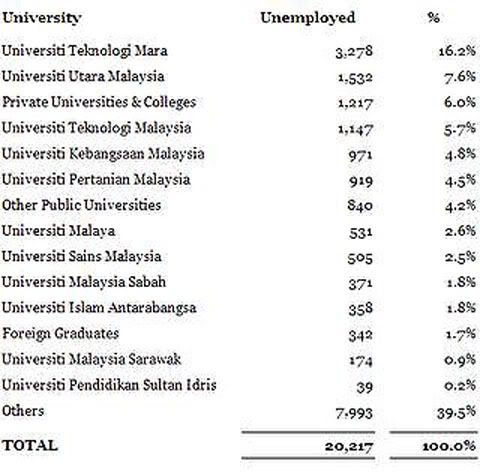We SayTo Students and Supporters of UiTM Who Oppose Tan Sri Khalid's Proposal,
When you, as bumiputeras, object to allow 'others' to study in UiTM, you are deemed to be intellectually afraid to compete academically with 'others'; in this case, 'the non-bumiputras'.
And we are talking about an intake of only 10 % non-bumiputeras, who may NOT even be the cream amongst them.
And when you are scared to compete academically with "others", even if you think you are the best of the lot, you are nothing more than a "one-eyed king in the kingdom of the blind."
Tan Sri Khalid wasn't asking you to compete with the world's best students, nor did he suggest that you compete with the cream of the non-bumiputeras, that's assuming they would be interested to apply for their course of choice at the UiTM.It says a lot about your weak mindset when 90 % of you are NOT ready to take head-on 10 % of non-bumiputeras in your class rooms and compete with them in the academic exams. You will always be known as, what we call, "intellectual cowards".
The proposal has nothing to do with wanting to deny 10% bumiputeras of tertiary education as there are other universities in the country .
Tan Sri Khalid, as a Malay/bumiputera himself who had seen enough in the private sector of the kind of quality of bumiputera graduates being mass-produced by some of our local public universities, is making his proposal for your own good, for the good of UiTM, for the good of the Malay/bumiputera community and for the good of the country.
The reasons for your objection are more due to your lack of sense of security, your self-worth, your self confidence and your paranoia of 'others', inculcated by the racially-based parochial policies of this UMNO-led Government over the last 50 years.
And that is sadly, the truth, however much you would want to deny.In any case, the quality of education in UiTM is nothing to crow about when compared to most other local public and private universities. Don't even try to match UiTM's academic performance with renown universities in other countries in the Asia-Pacific region.
Incidentally, we do NOT agree with blogger Datuk Ruhanie Ahmad that the proposal has anything to do with politics. That is a silly and ridiculous accusation.
All the tough talk by Datuk Ruhanie Ahmad and others in opposing Tan Sri Khalid's proposal is being "bodoh sombong."
Malaysian Unplug
Related Articles

Source:Ministry of Human Resources (2006)
Thousands of Universiti Teknologi Mara students marched to the Selangor Menteri Besar Tan Sri Khalid Ibrahim's Office in Shah Alam to protest his proposal of a 10 per cent intake quota to non-Bumiputra students.
Banners were displayed during the students’ march, allegedly with the approval of the university administration:
- "UiTM Hak Bumputera Selamanya" (UiTM will forever belong to Bumiputras),
- "Selamatkan UiTM" (Save UiTM),
- "We are not racists, we are just activists protecting our rights" and
- "10% = 12,000 non-Bumi — Malays' and Bumis' rights are being denied"
 Blogger Datuk Ruhanie Ahmad in his Kudakepang Blog called UiTM alumi to come out and oppose the Selangor MB's proposal.
Blogger Datuk Ruhanie Ahmad in his Kudakepang Blog called UiTM alumi to come out and oppose the Selangor MB's proposal.He wrote:
" UiTM - dulu ITM, Maktab MARA atau Maktab RIDA - adalah Institut Pengajian Tinggi (IPT) Bumiputera. Kewujudannya adalah berasas dan berlandaskan Perkara 153 Perlembagaan Persekutuan. Status ini tidak perlu dipertikaikan. Ia juga tidak wajar dirobah. Janganlah kerana politik maka status ini mahu digolok-dagaikan oleh sesiapa.Ruhanie Ahmad also warned the Selangor MB:
Selaku Setiausaha Agung Kesatuan Pelajar ITM (KPITM) 1970-1971, saya menyeru ratusan ribu graduan ITM dan kini UiTM, supaya bangkit, bersuara dan bertindak menentang sesiapa sahaja yang cuba mengganggu-gugat status quo IPT ini mutakhir ini.
Saya harap rakan-rakan kepimpinan pelajar ITM di tahun-tahun 1970-an, termasuklah Mansor Abdul Rahman, Samaruddin Rejab, Kamaruddin Sulaiman, Salleh Majid, Ibrahim Abu Shah, Zulkifli Abidin, Alias Ismail, Rozilah Razak, Abdul Jalil Din, Hamat Kama Piah, Salleh Sulong, Ibrahim Ali dan lain-lainnya bangkit, bersuara dan bertindak untuk mempertahankan UiTM yang kini mahu dibuka kepada pelajar bukan Bumiputera.
Oleh itu, mari kita pertahankan UiTM. Kita tentang habis-habisan sesiapa sahaja yang cuba merobah status quo di atas. Bujur lalu, melintang patah, seluruh lepasan UiTM mesti pertahankan IPT ini daripada diperkotak-katikkan oleh sesiapa."
Tan Sri Khalid Ibrahim thought it was a good idea to have non-bumiputras in UiTM as a way to raise the education quality as well as instill the spirit of competition among students at the UiTM which currently doesn't admit non-Bumiputras."...Kepada Menteri Besar Selangor, Tan Sri Khalid Ibrahim, wajar kita beri amaran awal, jika apa yang telah beliau suarakan mengenai UiTM baru-baru ini terus disuarakan, bersedialah hadapi kunsekuensinya.
Insaflah bahawa lulusan ITM dan UiTM yang ratusan ribu jumlahnya adalah satu force yang tidak boleh diperlekehkan oleh sesiapa, waima oleh seorang Menteri Besar!"
(Note: Datuk Ruhanie Ahmad graduated with Diploma in Public Adminstration from UiTM and with a Diploma in Journalisam from Essex, England. He worked for Musa Hitam as Press Secretary (1982-84) and as Political Secretary (1984-1986). Became Member of Parliament for Parit Sulong, Johore (1990-2004)
Tan Sri Khalid insisted that there was nothing wrong with the idea of opening up the institution which is fully funded by the government.He added that the state government would be prepared to meet students' representatives to discuss the matter.
Bumiputera Quota Policy
UiTM is the ONLY educational institution that provides Bumiputra-only policy for students.
Other government universities or public institutions of higher learning (IPTA) impose quotas on intake of students as well as quotas for scholarships. In the 1970s the quota was 55:45 for Bumiputra and non-Bumiputra students for the IPTA intake.
The ratio has increased to almost 70:30 in recent years.
The quota for Public Services Department (JPA) scholarships are also within the ratio of 75: 25.
The restriction in IPTA has brought an increase of enrolment with the local private institutions of higher learning (IPTS), with an almost a 1:1 ratio with IPTA.
COMMENTARY
From "The Tempinis Diaries" Blog: Read here for more
Excerpts:
The Perrenial Problem with Quality of Malaysian Universities
November 2007
The Times Higher Education Supplement Rankings has just been released.
The decline in rankings for Malaysian universities accurately reflects the sorry state of higher education in Malaysia.I remember as an undergraduate and postgraduate student, I would hardly ever come across any articles published in international journals by Malaysian academics. Those that I did stumble upon were usually quite poorly written. Like it or not, universities nowadays are judged by their research output. If a university is not producing internationally respected research work, it is inevitable that its reputation will suffer.
What then is the problem with Malaysian universities?
The problem is both a systemic problem and a funding issue.
- Systemic Problems
Bumiputera-ism in recruitment and promotion:The systemic problem is that universities in Malaysia are NOT run in a meritocratic fashion both in terms of recruitment and promotion of faculty members and student admissions.
It is no secret in Malaysia that Bumiputras get preferential treatment as faculty members and admission as students. In the long term, this model makes Malaysian universities uncompetitive internationally.
World class universities need to be run in a meritocratic fashion.
You need to hire and promote the best person for the job regardless of race and nationality and you need to admit the most qualified students. Otherwise people will leave and the institution will suffer. And they have.
Just take a look at NUS. NUS hires the best person for the job regardless of nationality. It was reported that 52 % of their faculty members are non-Singaporeans. It is no wonder that NUS has progressed so far as compared to their Malaysian counterparts. NUS taps into the global talent market whereas Malaysia is not even able to tap into the best of their local talent pool.
Poor Academic Environment:For a university to succeed, it is important to create an environment where the production of good quality research is valued. You should have a system where you give out tenure and make people professors because they produce research that your university is proud of.
You should not promote people because of their race or the fact that they politic well or become deans or vice deans.
Research is hard work. If people know they can get promoted by other means other than doing research, they will. Quite apart from the problem of not practising meritocracy, there are a lot of other systemic problems in Malaysian universities.
Malaysian universities have terrible infra-structure (old buildings / hostels / terrible accommodation for visiting staff etc) as compared to American and Singapore universities.
Working Permits for Foreign Spouses: Another systemic problem which exists is that it is next to impossible to get a working permit for a foreign spouse in Malaysia. How then does Malaysia expect to recruit international faculty members who have spouses who might want to work? It is quite unreasonable to expect their spouses to just sit at home and take care of their kids.- Funding Problem
I think the Vice Chancellor of UM is right in saying that UM cannot compete globally because it is too poorly funded (RM 400 million as opposed to NUS’ S$ 1.2 billion).
If a university is poorly funded, how can that university afford: (a) to buy the latest lab equipment; (b) to stock up on a good library; and (c) to hire good people?
I am told that the starting pay for academics in Malaysia is quite paltry. How then can Malaysian universities hire the top student in each cohort to become their faculty member?
And why would any internationally respected academic want to come to Malaysia to work for such paltry salary? But the solution does not lie in just throwing money at the universities. If the systemic problem of not hiring the best person for the job is not resolved, money will not solve the problem.Is There a Way Out?
Can anything be done to arrest the decline of Malaysian universities?
The Bumiputra system is so entrenched in the country that anytime one questions it, we will have some nut case waving a KERIS at the UMNO general assembly screaming blue murder.
It seems that Malaysia has reached some sort of cross road on this issue.One is to change.
- OPTION ONE: Run the top universities in the country like UM and UKM on a purely meritocratic system.
Hire the best people for the job. And recruit the BEST students for these universities.
Perhaps, the other universities can still continue to practice Bumiputra-ism but at least there will still be the hope of pockets of excellence in the country.
This is a bitter political pill to swallow. But I believe that it is worth going down this route.
The decline of Malaysian universities will eventually hurt Bumiputras.
So what if you get more Bumiputras in UM or UKM, if all you get is a mediocre education that is not internationally competitive.- OPTION TWO: The second option is accept status quo. Do nothing.
But accept that Malaysian universities will keep on going down.
And don’t act so surprised every year when the rankings come out.
No comments:
Post a Comment